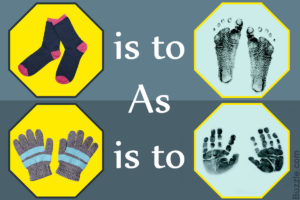One of Jonathan Edwards’ favorite rhetorical reasoning tools is an analogy. Here’s an example from his sermon, Christian Happiness. Edwards is arguing that a godly person does not need to be afraid of any troubles on earth.
First, “what need a man be afraid of storms and tempests without, that has so good a shelter?” (Kimnach, p. 301) Edwards is referring to a Christian having God and Christ watching over him.
Then, “And is there any man here present that would be at all afraid of the pain of the prick of a pin for a minute, if he knew that after it he should enjoy a life of–suppose–seventy years of the greatest prosperity imaginable, without the least molestation?” (pp. 301-302). Edwards is referring to suffering a little during one’s earthly life versus enjoying eternity pain-free.
Those are two quick examples of how Edwards gains clarity and adds strength to his arguments. And he does this a lot.
Me, not so much. But I’m learning.
I’m learning that analogies are a great way to explain and argue for the truth of Scripture. Analogies like the second one above force the listener to say:
“No person in their right mind would ever allow their fear of a little needle stick to keep them from getting a vaccine that would save their life.” (That was my quick attempt to create a variation of Edwards’ analogy)
And that’s what we want to happen in our listener’s minds. We want the force of our argument to force our congregants to agree with God’s Word.
Finally, I was thinking that Edwards’ analogies are functioning like a kind of illustration. Usually, illustrations in sermons can take a while. What I like about Edwards’ version is they don’t take up lots of message minutes, but they are effective.
Anyway, before Sunday see if your Scripture and sermon can use the help of an analogy to add clarity and strength to your argument so God receives glory in the church and in Christ Jesus (Ephesians 3:21).
Randal
P.S. Merry Christmas!










